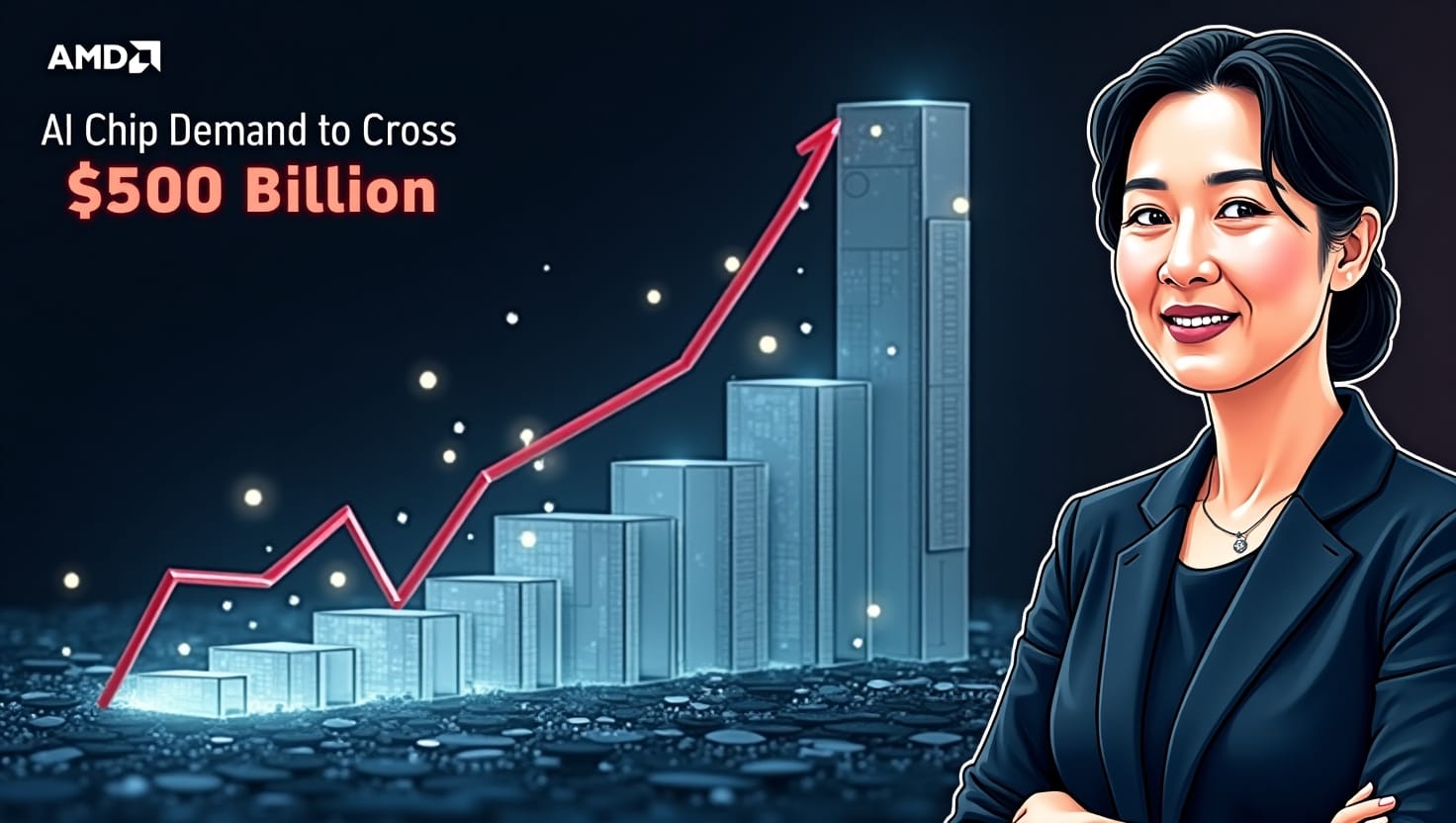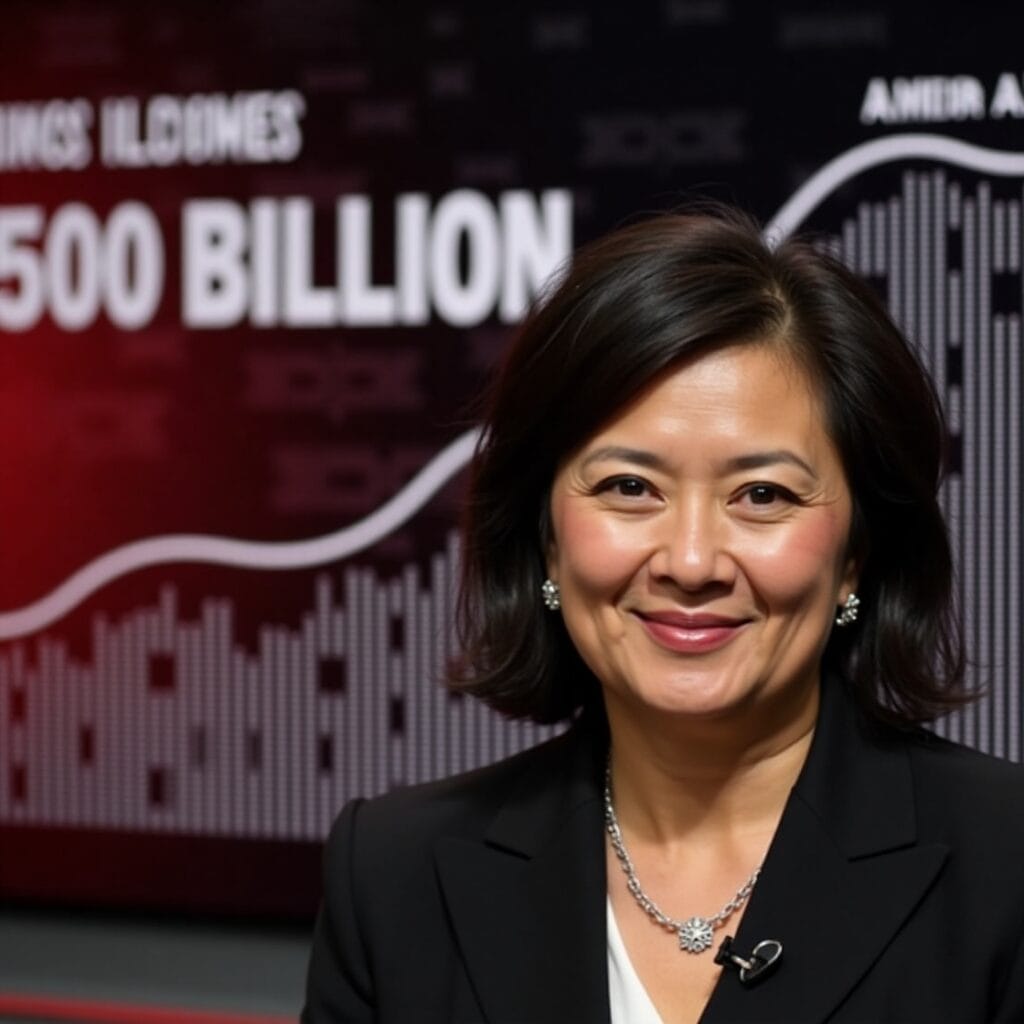
Introduction
The future of AI is no longer just about software—it’s now a race in hardware innovation, especially AI chips. In a bold forecast, AMD CEO Lisa Su has predicted that global demand for AI chips could surpass $500 billion in the next few years.
But it doesn’t stop there. She also envisions a “Cambrian explosion” of custom AI chips, each uniquely tailored to meet the diverse needs of AI models, platforms, and applications.
This prediction is not just speculation—it’s based on real trends from giants like OpenAI, xAI (Elon Musk’s AI company), Google, Meta, and others who are driving the next wave of AI infrastructure.
$500 Billion AI Chip Market: The Next Frontier
Lisa Su’s statement highlights the unprecedented demand for AI-optimized hardware. Traditionally, general-purpose GPUs (like those from NVIDIA) have powered most AI applications. But that is changing rapidly.
Key Drivers of the Surge:
- Exponential growth in AI training and inference workloads.
- Data centers across the globe are investing billions in specialized chips.
- AI leaders such as OpenAI, Google DeepMind, Microsoft, and Meta are developing increasingly complex models.
- Custom silicon offers better performance, cost-efficiency, and energy savings than general-purpose processors.
“We believe AI represents a once-in-a-generation shift in computing, and the silicon demand behind it is going to be enormous,” — Lisa Su, AMD CEO

The Cambrian Explosion of Custom AI Chips
Lisa Su used the term “Cambrian explosion” to describe the upcoming surge in custom-designed chips. Just as life on Earth once rapidly diversified, she believes AI hardware will soon branch out into countless specialized forms.
The Shifting Landscape of AI Chip Demand
The AI industry has entered a hyper-growth phase, with demand for processing power outpacing supply at an unprecedented rate. While GPUs have dominated AI workloads for years, the shift toward custom AI chips—tailored for specific models, applications, and sectors—marks a transformative change in the semiconductor market.
Lisa Su, AMD’s visionary CEO, compares this trend to a “Cambrian Explosion”—a period in Earth’s history where life rapidly diversified. In this context, the “lifeforms” are specialized chips designed for AI training, inference, robotics, and edge computing.
Why the $500B Projection is Realistic
Market research firm projections suggest that by 2029–2030, AI chip sales could cross the half-trillion-dollar threshold, driven by:
- Exponential AI adoption in healthcare, finance, defense, and autonomous systems.
- Generative AI’s compute-hungry models requiring unprecedented processing speeds.
- Custom chip architectures optimized for specific algorithms, saving power while boosting performance.
- Governments and enterprises stockpiling AI compute for national security and economic competitiveness.
Custom Chips: The Next Big Competitive Edge
General-purpose chips like NVIDIA’s H100 or AMD’s MI300X remain crucial, but the future belongs to domain-specific architectures:
- LLM-Optimized Chips for faster generative AI model training.
- Vision AI Accelerators for autonomous vehicles and industrial robotics.
- Quantum-Inspired Chips for optimization problems in logistics and drug discovery.
Apple’s Neural Engine, Google’s TPU, and Amazon’s Inferentia already prove that in-house custom chips can slash costs and energy usage while boosting model throughput.
The Strategic Role of AMD
AMD is positioning itself as both a direct competitor to NVIDIA in AI GPUs and a partner for companies building their own silicon. Lisa Su envisions AMD providing core IP blocks, chiplet architectures, and AI acceleration modules that customers can integrate into bespoke designs. This hybrid model could make AMD the “arms dealer” of the AI revolution.
AI Chip Manufacturing Bottlenecks
Crossing the $500B mark isn’t just about design—it hinges on manufacturing capacity. TSMC, Samsung, and Intel Foundry Services are racing to expand advanced node production at 3nm and below. The bottlenecks include:
- Extreme Ultraviolet (EUV) Lithography machine supply limits.
- Substrate shortages for advanced packaging.
- Geopolitical risks in Taiwan and South Korea.
To mitigate risk, AMD and others are exploring multi-source foundry strategies and investing in chiplet-based modular designs, which allow mixing process nodes without sacrificing performance.
The Cambrian Explosion Analogy
Lisa Su’s use of “Cambrian Explosion” is not just marketing flair—it’s a prediction of diversity, specialization, and survival of the fittest in AI silicon. In the next five years, we could see:
- Edge AI chips that run on solar power for remote deployments.
- AI security chips with built-in zero-trust encryption.
- Healthcare-specific AI accelerators for genome sequencing and imaging diagnostics.
Investor Implications
For investors, this explosion means semiconductor equities, particularly those tied to AI accelerators, could outperform the broader market. But volatility will be high as the ecosystem undergoes rapid consolidation and fierce competition. Expect:
- Startups disrupting traditional players with radical architectures.
- Mergers and acquisitions to secure intellectual property.
- Surging valuations for companies with chip design automation (EDA) tools.
The Road Ahead
If Lisa Su’s prediction holds, the AI chip sector could become as fundamental to the global economy as oil was in the 20th century. Custom silicon will be the invisible engine powering everything from personalized medicine to autonomous warfare.
As we stand at the dawn of this Cambrian-like era, the real question isn’t whether AI chip demand will hit $500B—it’s which companies will survive and dominate when the dust settles.
AI Workload Evolution: Why Chips Must Adapt
The rise of transformer-based models, multi-modal AI, and real-time inference workloads has completely changed chip design priorities.
- 2015–2019 → GPUs ruled for training deep learning models.
- 2020–2023 → TPUs and FPGA-based accelerators began to appear for specific workloads.
- 2024–2025 → AI models require custom hardware pipelines to achieve speed, efficiency, and cost-effectiveness.
For example, inference at scale for generative AI (like ChatGPT serving millions of queries daily) demands chips optimized for low latency and high throughput, while still minimizing power draw.
How AI Chip Costs Will Change by 2030
Today’s AI chips, such as NVIDIA’s H100, cost $25,000–$40,000 per unit, but with the coming wave of custom silicon:
- Cost per inference could drop by over 80% as chips are fine-tuned for a single purpose.
- AI model training costs could fall dramatically as memory bandwidth and AI math units (like INT8/FP16 accelerators) become more efficient.
- Governments and corporations will buy chips in bulk, pushing total market size to $500B+ even as individual chip prices drop.
The Geopolitical Side of AI Chips
The AI chip boom isn’t just an economic story—it’s a geopolitical arms race.
- The U.S. is investing heavily in domestic manufacturing through the CHIPS and Science Act to reduce reliance on foreign fabs.
- China is accelerating its own custom AI chip programs to counter U.S. export bans.
- The EU is pushing for “AI sovereignty” by funding semiconductor startups to avoid dependence on U.S. or Asian chip giants.
In this race, custom chips may become state-controlled strategic assets, just like nuclear technology in the past.
Custom AI Chips at the Edge: The Silent Revolution
Most people think AI chips are only for giant data centers—but edge AI could be the hidden growth driver.
Edge AI chips are designed for:
- Smart cameras that process data locally without sending it to the cloud.
- Industrial robots performing real-time defect detection.
- Drones analyzing images mid-flight for search-and-rescue missions.
By 2030, over 50% of AI inference could happen at the edge, meaning billions of custom chips will be embedded in everyday devices.
Sustainability: The Green AI Chip Movement
AI workloads are energy-hungry, but custom chips could slash carbon footprints through:
- Lower power usage per operation via application-specific designs.
- 3D packaging to reduce interconnect energy loss.
- On-device AI processing that removes the need for massive data transfers to cloud servers.
Companies like AMD, Intel, and Cerebras are already marketing sustainability as a selling point for their next-gen chips.
From Silicon to Systems: The Vertical Integration Trend
One key reason custom AI chips are exploding is vertical integration—companies no longer just design chips; they own the stack:
- Meta: AI chips + in-house AI frameworks + data centers.
- Tesla: AI chips for FSD (Full Self Driving) + proprietary software + hardware integration.
- Amazon: Inferentia chips + AWS hosting + model training APIs.
AMD could position itself as the “enabler” of these vertically integrated AI systems, making its technology a foundational layer across industries.
What the Next 5 Years Could Look Like
Here’s a possible timeline for the AI chip market explosion:
- 2025 → Rapid adoption of AI-powered business workflows. Custom chip orders surge.
- 2026–2027 → AI chips become embedded in nearly all consumer electronics.
- 2028 → AI-specific data centers dominate over general-purpose cloud servers.
- 2029–2030 → AI chip market surpasses $500B, driven by mass deployment across healthcare, finance, defense, and entertainment.
Real-World Examples:
- Tesla’s Dojo chip for autonomous driving.
- Google’s TPU (Tensor Processing Units) for training large language models.
- Amazon’s Inferentia & Trainium chips for cloud AI.
- OpenAI and xAI reportedly exploring their own chip development paths.
This shift means AI companies will no longer just be software innovators—they’ll be hardware designers too.
AMD’s Strategy in the AI Chip Race
AMD is not sitting idle. In fact, it’s positioning itself as a major player in the AI hardware ecosystem.
Explore: statista
AMD’s Moves:
- Launch of MI300X series AI chips, targeting data centers and LLM workloads.
- Strategic partnerships with Microsoft Azure, Meta, and Oracle Cloud.
- Focus on building a scalable, open AI ecosystem to challenge Nvidia’s dominance.
Lisa Su emphasized AMD’s commitment to serving both cloud-based and edge-AI applications.
Industry Impact: What This Means for the AI Future
The forecasted AI chip boom will transform not just large tech companies but the entire AI ecosystem, including:
- Startups and researchers getting faster, more affordable compute.
- Smart devices powered by on-device AI.
- AI accessibility expanding to new industries like healthcare, agriculture, and education.
Possible Outcomes:
- Reduced cost per training token
- Local AI inference on phones and IoT devices
- Accelerated innovation in robotics and autonomous vehicles
Looking Ahead: What to Watch For
As the AI chip industry scales, expect to see:
- A rise in chip-design startups focused on niche AI use cases.
- Governments and global alliances investing in sovereign AI hardware.
- New standards in AI energy efficiency and compute governance.
The intersection of AI and silicon will define the next decade of technological progress.
Final Thoughts
Lisa Su’s prediction isn’t just ambitious—it reflects a seismic shift already underway in the tech world. AI is no longer just about algorithms and models. The battlefield is now in silicon, and the winners will be those who can combine software brilliance with hardware precision.
As companies race to build the future of intelligence, custom chips will be the brain behind every breakthrough. 🔌⚡
Discover the future of AI and tech, today — visit USAtrends.tech.





